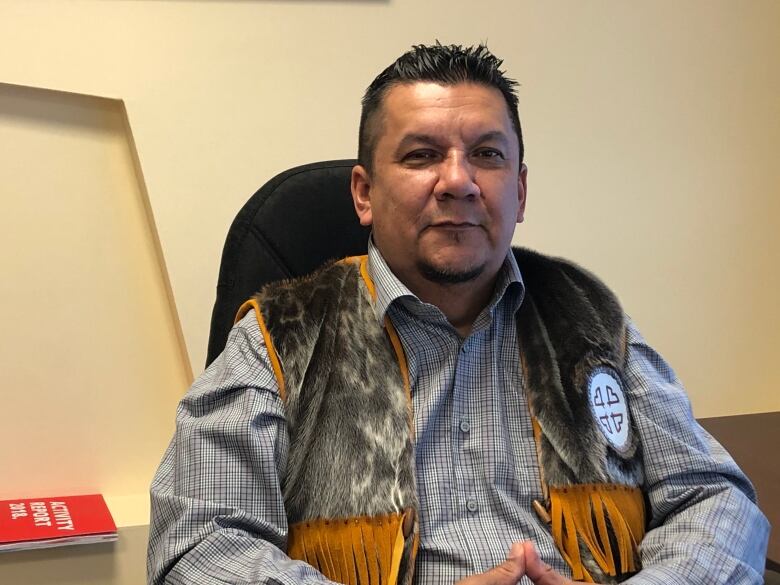Cree opposition building in northern Quebec to Bill 96's language restrictions
Bill ignores treaty rights, damages otherwise good relations with Quebec, Cree leaders say

Cree opposition to Bill 96 continues to build with more local and regional leaderssaying Quebec's reform of the Charter of the French language fails torecognize Cree treaty rights and will have a negative impact on otherwise good relations with the province.
Officials with the Cree Nation Government say Bill 96will negatively affect Cree rights and the "social, cultural, economic and political development" of the nation.
"We have shared ... our concerns with the government of Quebec and indicated our willingness to work with [the government]to find solutions," said CreeGrand Chief Mandy Gull-Masty in a statement.
Officials also say Bill 96 ignorestreaty rights guaranteed under the James Bay and Northern Quebec Agreement, signed by the Cree and the Inuit of northern Quebec in 1975.
Gull-Masty doesn't say what the Cree might do to protect those rights, only that they will continue to closely monitor and assess the impacts of the new law.
The Quebec government's position has been that the new law doesn't affect the right of Indigenous communities in Quebec to develop and maintain their language and culture.
Last month, Quebec's Indigenous Affairs minister, Ian Lafrenire,visited several Cree and Inuit communities in advance of the bill's adoption. At the time, spokesperson Mathieu Durocher told CBCthere's agreement that Indigenous languages and cultures must be respected and promoted. Durocher saidthe government would keep looking for "concrete solutions" alongside Indigenous communities.
The 'we don't do English' mentality sets us all back.- Daisy House, Cree Nation of Chisasibichief
For the chief of the Cree Nation ofChisasibi, the largest of the Cree communities, with a population of more than 5,000, Bill 96 is a slap in the face.
"[Bill 96] is closing up the territory. It's closing up the province," said Chisasibi Chief Daisy House, adding it's going to negatively affectCree youth and force them to go to post-secondary school inOntario, farther away from their culture and language.
When House went to post-secondary in the 1990s, she says she struggled with the French requirements needed to graduate at the time.
"I had to pass twoFrench courses and I struggled even thoughI went to school in elementary and high school in French. It was my third language," said House.

Under the new law, students will have to pass five French-language courses in order to graduate CEGEP, as public colleges are called in Quebec
"The 'we don't do English' mentality sets us all back and will negatively impact our nation, province, and country," House said in a statement.
"It's an inconvenient and disrespectful obstacle for our nation to face when it comes to business, economic development, education, and attempting to strengthen our nation-to-nation relationship with Quebec."
Sweeping language restrictions
Bill 96 passed last month and will impose language restrictions on municipalities and small businesses with more than 25 employees.
On top of requiring more French courses to graduate, the legislation also places a cap on the number of students who can attend English-language CEGEPs.
It will also limit the use of English in most public services and in the courts.
Bill 96 also holds an exemption that a language other than French can be used "where health, public safety or the principles of natural justice so require" and government officials have said health care services will continue to be available in English.

But it is unclear when the exemption can be applied and what the new law means for non-public-facing parts of the health care network.
The head of the Cree Board of Health and Social Services of James Bay, Bertie Wapachee, said his board hasn't yet been able to fully discuss the new law and its potential impact.
Speaking personally, Wapachee said Bill 96 will be a burden on the Cree Nation and the Cree people.
"It's like they disregard our language," said Bertie Wapachee in an interview in Cree.
"I don't feel we can give in to the laws that come into place. I look forward to us [the Cree] collaborating so that our language is recognized and the French language isn't forced on us.
"I know [Bill 96]will cause friction when we work together, because this is another language that will again be forced on us."












_(720p).jpg)


 OFFICIAL HD MUSIC VIDEO.jpg)
.jpg)



























































































